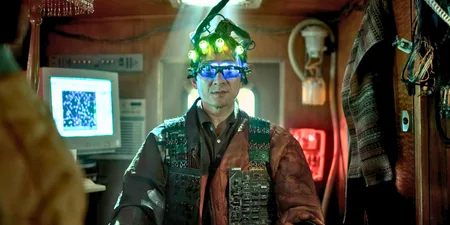The storyline around Lee Carter’s depression has made increasingly difficult viewing in EastEnders and last night it reached an emotive climax.
It all seemed to become too much for Lee after an unbearable day that started with an argument with his wife Whitney, who maybe pregnant (and later discovered he’d been looking up expensive baby gear online).
Then he panicked about losing the soulless callcentre job he hates after a nightmare commute. Only to then find out he had in fact passed his review and would be staying in the gig that had just made him mis-sell an overpriced gas and energy package to a vulnerable pensioner.
To add to his misery he spent the day being goaded by his bullying colleague Oz, who caught him crying in the lift and then taunted Carter about his wife leaving him as soon as she gets a ‘whiff of a real man’.
The episode ended with Lee having an angry tearful meltdown in his car before ominously scrawling ‘I’m sorry’ on the back of a parking ticket and storming off.
It has been a powerful portrayal of the mental health problems young men can face and the actor playing Lee, Danny-Boy Hatchard, has felt the weight of the storyline.
The 25-year-old has since opened up about the what it has been like playing the increasingly despairing on-screen son of Danny Dyer.
He told Press Association:
“Of course it is a lot of pressure but I think I’m more honoured than anything, because someone has to do it.
“I think it’s become such a common thing, not just people who suffer with mental illness, also people who don’t understand it and form a stigma around it.
“I think that kind of drive to abolish that stigma and to encourage people who are suffering to talk and to know that it is OK, the way that they are feeling…
“It’s a responsibility I’m happy to take.”
If you are struggling with depression, The Samaritans operates a service 24 hours a day, 365 days a year, for people who want to talk in confidence. Call 08457 90 90 90.
Resources are available on Anxiety UK and support groups are also available at Mind and Rethink.
There is more information about symptoms, diagnosis and treatment at NHS Choices and there’s also a useful podcast about anxiety and worry.








































